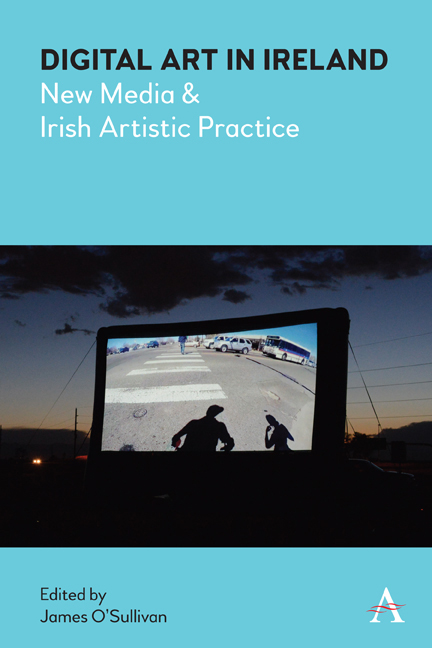Book contents
- Frontmatter
- Dedication
- Contents
- List of Illustrations
- Acknowledgements
- Notes on Contributors
- Chapter 1 Introduction: Digital Art in Ireland
- Chapter 2 Strange Mothers: The Maternal and Contemporary Media Art in Ireland
- Chapter 3 Between Aesthetics and Institutions: Irish Electronic Poetry
- Chapter 4 ‘to shine upon the original all the more fully’: Contemporary New Media Adaptations of James Joyce
- Chapter 5 Art in the Data-City: Critical Data Art in the Age of Surveillance Capitalism
- Chapter 6 Experimental Arcade Video Games as Self-Reflexive Media Art
- Chapter 7 Folding, Unfolding, Refolding Sound Claire Fitch
- Chapter 8 Treacherous Images and Animal Gazes: Ailbhe Ní Bhriain's Reports to an Academy, 2015
- Chapter 9 Pressing Send: Distribution and Curation in Irish New Media Art
- Index
Chapter 4 - ‘to shine upon the original all the more fully’: Contemporary New Media Adaptations of James Joyce
Published online by Cambridge University Press: 23 February 2022
- Frontmatter
- Dedication
- Contents
- List of Illustrations
- Acknowledgements
- Notes on Contributors
- Chapter 1 Introduction: Digital Art in Ireland
- Chapter 2 Strange Mothers: The Maternal and Contemporary Media Art in Ireland
- Chapter 3 Between Aesthetics and Institutions: Irish Electronic Poetry
- Chapter 4 ‘to shine upon the original all the more fully’: Contemporary New Media Adaptations of James Joyce
- Chapter 5 Art in the Data-City: Critical Data Art in the Age of Surveillance Capitalism
- Chapter 6 Experimental Arcade Video Games as Self-Reflexive Media Art
- Chapter 7 Folding, Unfolding, Refolding Sound Claire Fitch
- Chapter 8 Treacherous Images and Animal Gazes: Ailbhe Ní Bhriain's Reports to an Academy, 2015
- Chapter 9 Pressing Send: Distribution and Curation in Irish New Media Art
- Index
Summary
On 1 January 2012 copyright on the works of James Joyce (1882–1941) expired, in line with Irish copyright laws which stipulate that original work be protected by an estate for 70 years after the death of the work's creator. Before this date, Joyce's work was read, celebrated, but strictly controlled by the Joyce estate and rarely engaged with in any substantial way by those artists wishing to reproduce or adapt the original texts. In the few years since the expiration of copyright, a wave of various projects has been initiated which adapt almost all of Joyce's original texts. While a number of these adaptations are quite traditional in nature, some have sought to bring Joyce's work into new genres which do not conform to conventional literariness. Each adaptation of these pieces exploits the relative freedom the expiration of copyright has afforded to produce challenging reimaginings and reinterpretations of work central to the canon of modern Irish, European and Anglophone literature, a number of which transfer the written text onto the screen in various ways. The production of new media screen adaptations of Joyce's work does have certain limitations, as it may be seen as privileging the original text and underlining its position in the hierarchical canon. As adaptations, however, these projects also negotiate a complicated relationship with the original texts and present alternative versions and experiences which progressively challenge established interpretations and expected modes of engagement.
Old Media Adaptations: A Survey
‘Joyce Today’, a project launched in Spring 2017 as part of the Digital Platform for Contemporary Irish Writing (www.contemporaryirishwriting.ie), provides a detailed survey of adaptations of Joyce's work in the first five years after the expiration of copyright. Published adaptations of Joyce's texts produced after 2012 include Dubliners 100, a printed collection of rewritings of the stories of Joyce's Dubliners by established and emerging Irish writers and edited by Thomas Morris, and Odysseus Abroad, by novelist Amit Chaudhuri, which offers a modern retelling of Joyce's Ulysses set in London and featuring two Indian men. A number of adaptations have also been produced for the stage, most notably perhaps Frank McGuinness's dramatic adaption of Joyce's ‘The Dead’, from Dubliners, which was performed at the Abbey Theatre in December 2012.
- Type
- Chapter
- Information
- Digital Art in IrelandNew Media and Irish Artistic Practice, pp. 53 - 70Publisher: Anthem PressPrint publication year: 2021

